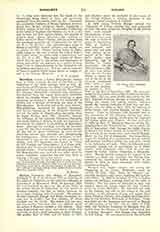

Baradaeus, JACOB, a Syrian Monophysite bishop, born at Tella, towards the end of the fifth or the beginning of the sixth century, died in 578. He was the son of Theophilus bar MƒÅnà, a priest of Tella, and hence his real name was Jacob bar Theophilus; the surname Brúde’ƒÅnae, corrupted into Baradaeus, was derived from the coarse horse-cloth bàrdà`thaen which he usually wore. After receiving a good education he became a monk in the monastery of Pesíltae, and a disciple of Severus, the head of the Monophysites. In the first half of the sixth century, Monophysitism, weakened by internal dissensions and by the opposition of the Emperor Justinian, was on the verge of disappearing, especially when its leader Severus died, 538. Probably through the influence of the Empress Theodora, Baradaeus was made Bishop of Edessa in 543, and henceforth devoted all his energies to the defense of Monophysitism. Through his untiring activity he breathed a new life into what seemed a mere expiring faction. At the cost of great hardships, he went around ordaining priests and deacons and strengthening his coreligionists. There exists a profession of faith addressed to him by the abbots of the province of Arabia, with 137 signatures (see Lamy, in “Actes du Xle Congrès des Orientalistes”, § 4, Paris, 1897) showing that he was the undisputed leader in Monophysite circles. It is because of his prominence that the Monophysites were, and still are, called after his name, Jacobites. Baradaeus has left very little in writing: a liturgy, and a few letters.
R. BUTIN

